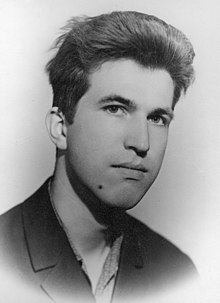
Yuri Matiyasevich
Yuri Matiyasevich | |
|---|---|
 | |
| Born | 2 March 1947 |
| Nationality | Soviet Russian |
| Alma mater | Leningrad State University |
| Known for | his contribution to computability theory, especially solving Hilbert's tenth problem, through Matiyasevich's theorem |
| Awards | Petersburg Mathematical Society Prize (1970), Markov Prize (1980), Humboldt Award (1998) |
| Scientific career | |
| Fields | Mathematics and Theoretical computer science |
| Institutions | Petersburg Department of Steklov Institute of Mathematics |
Yuri Vladimirovich Matiyasevich, (Russian: Ю́рий Влади́мирович Матиясе́вич; born 2 March 1947 in Leningrad) is a Russian mathematician and computer scientist. He is best known for his negative solution of Hilbert's tenth problem (Matiyasevich's theorem), which was presented in his doctoral thesis at LOMI (the Leningrad Department of the Steklov Institute of Mathematics).

Biography
Early years and education
Yuri Matiyasevich was born in Leningrad on March 2, 1947. The first few classes he studied at school No. 255 with Sofia G. Generson, thanks to whom he became interested in mathematics. In 1961 he began to participate in all-Russian olympiads. From 1962 to 1963 he studied at Leningrad physical and mathematical school No. 239. Also from 7th to 9th grade he was involved in the mathematical circle of the Leningrad Palace of Pioneers. In 1963-1964 he completed 10th grade at the Moscow State University physics and mathematics boarding school No. 18 named after A. N. Kolmogorov.[1][2]

In 1964, he won a gold medal the International Mathematical Olympiad[3] and was enrolled in the Mathematics and Mechanics Department of St. Petersburg State University without exams. He took his high school diploma exams as a first-year student.[4][5]

Being a second-year student, he released two papers in mathematical logic that were published in the Proceedings of the USSR Academy of Sciences. He presented these works at the International Congress of Mathematicians in 1966.[2]

After graduation, he enrolled in graduate school at St. Petersburg Department of Steklov Mathematical Institute of the Russian Academy of Sciences (POMI). In 1970, under the guidance of Sergei Maslov, he defended his thesis for the degree of Candidate of Sciences in Physics and Mathematics.[6]

In 1972, at the age of 25, he defended his doctoral dissertation on the unsolvability of Hilbert's tenth problem.[7]

From 1974 Matiyasevich worked in scientific positions at LOMI, first as a senior researcher, in 1980 he headed the Laboratory of Mathematical Logic. In 1995, Matiyasevich became a professor at POMI, initially at the chair of software engineering, later at the chair of algebra and number theory.[8]

In 1997, he was elected as a corresponding member of Russian Academy of Sciences. Since 1998, Yuri Matiyasevich has been a vice-president of St. Petersburg Mathematical Society. Since 2002, he has been a head of St.Petersburg City Mathematical Olympiad.

Since 2003, Matiyasevich has been a co-director of an annual German–Russian student school JASS.

In 2008, he was elected as a full member of Russian Academy of Sciences.[9]

He was a member of the American Mathematical Society and the Association for Symbolic Logic; and also of the editorial boards for the journals Discrete Mathematics and Applications and Computer Instruments in Education. As a teacher, he mentored Eldar Musayev, Maxim Vsemirnov, Alexei Pastor, Dmitri Karpov[10]

A polynomial related to the colorings of a triangulation of a sphere was named after Matiyasevich; see The Matiyasevich polynomial, four colour theorem and weight systems.

Awards and honors
- 1964: Gold medal at the International Mathematical Olympiad held in Moscow.
- 1970: "Young mathematician prize" of the Leningrad Mathematical Society.[11]
- 1980: Markov Prize of Academy of Sciences of the USSR.
- 1996: Honorary Degree, Université d'Auvergne.
- 1998: He received Humboldt Research Award.
- 2003: Honorary Degree, Université Pierre et Marie Curie (UPMC).
- 2007: Member of the Bavarian Academy of Sciences.
Selected works
- At the age of 22, he came with a negative solution of Hilbert's tenth problem (Matiyasevich's theorem), which was presented in his doctoral thesis at LOMI (the Leningrad Department of the Steklov Institute of Mathematics).[12]
- In number theory, he answered George Pólya's question of 1927 regarding an infinite system of inequalities linking the Taylor coefficients of the Riemann -function. He proved that all these inequalities are a consequence of a single functional inequality linking the Fourier transform of a -function and its derivatives.[13]
- In graph theory, he found an unexpected connection between the four color theorem and divisibility of binomial coefficients, and gave a probabilistic interpretation of the four color theorem.[13]
- He discovered a number of new interesting qualities of the zeros of the Riemann -function.[10]
Book
- Yuri Matiyasevich Hilbert's 10th Problem, Foreword by Martin Davis and Hilary Putnam, The MIT Press, 1993. ISBN 0-262-13295-8.
Papers
- Yuri Matiyasevich (1973). "Real-time recognition of the inclusion relation" (PDF). Journal of Soviet Mathematics. 1 (1): 64–70. doi:10.1007/bf01117471. ISSN 0090-4104. S2CID 121919479.
- Yuri Matiyasevich, Julia Robinson (1975). "Reduction of an arbitrary Diophantine equation to one in 13 unknowns". Acta Arithmetica. XXVII: 521–549.
- Yuri Matiyasevich, Géraud Sénizergues (1996). "Decision Problems for Semi-Thue Systems with a Few Rules". LICS.
- Yuri Matiyasevich, Proof Procedures as Bases for Metamathematical Proofs in Discrete Mathematics, Personal Journal of Yury Matiyasevich.
- Yuri Matiyasevich, Elimination of bounded universal quantifiers standing in front of a quantifier-free arithmetical formula, Personal Journal of Yuri Matiyasevich.
- Yuri Matiyasevich, A Polynomial related to Colourings of Triangulation of Sphere, Personal Journal of Yuri Matiyasevich.
- Yuri Matiyasevich (2004). "Some Probabilistic Restatements of the Four Color Conjecture". Journal of Graph Theory. 46 (3): 167–179. doi:10.1002/jgt.10178. S2CID 30591818.
See also
References
- ^ Varpahovsky & Varpahovsky 1970, p. 6.
- ^ a b Beltyukov 2017, p. 6.
- ^ "International Mathematical Olympiad". www.imo-official.org. Retrieved 2023-05-20.
- ^ Varpahovsky & Varpahovsky 1970, p. 38.
- ^ "Из хронологии математико-механического факультета" [Chronology of the Department of Mathematics and Mechanics]. Archived from the original on 2020-08-04. Retrieved 2019-01-12.
- ^ Beltyukov 2017, p. 5.
- ^ Beltyukov 2017, p. 7.
- ^ Beltyukov 2017, p. 9.
- ^ "Список избранных членов РАН" [List of RAS full members]. Archived from the original on 2022-06-10. Retrieved 2013-08-17.
- ^ a b "Академику Матиясевичу Юрию Владимировичу - 70 лет!" (in Russian). Российская Академия наук. 2017-03-02. Retrieved 2023-03-16.
- ^ "SPb. Math. Soc. Prizes". www.mathsoc.spb.ru.
- ^ Beltyukov 2017, p. 8.
- ^ a b Beltyukov 2017, p. 10.
Sources
- Beltyukov, A. P. (2017). "To the anniversary of Yuri Vladimirovich Matiyasevich". Computer Tools in Education (6): 5–11.
- Varpahovsky, F.; Varpahovsky, A. (1970). "On solving Hilbert's tenth problem". Kvant (Magazine) (7): 38–44.
External links
- Yuri Matiyasevich's home page.
- Yuri Matiyasevich at DBLP.
- Yuri Matiyasevich's results at International Mathematical Olympiad
- Matiyasevich theorem on Scholarpedia.
- Vita and collaboration with France (in French).
- O'Connor, John J.; Robertson, Edmund F., "Yuri Matiyasevich", MacTutor History of Mathematics Archive, University of St Andrews
- Supercomputing for a Superproblem: A Computational Journey Into Pure Mathematics
- 1947 births
- 20th-century Russian mathematicians
- 21st-century Russian mathematicians
- Saint Petersburg State University alumni
- Living people
- Full Members of the Russian Academy of Sciences
- Mathematicians from Saint Petersburg
- Russian computer scientists
- Russian logicians
- Soviet logicians
- Soviet computer scientists
- Soviet mathematicians
- International Mathematical Olympiad participants
- Academic staff of Saint Petersburg State University
- Russian scientists
See what we do next...
OR
By submitting your email or phone number, you're giving mschf permission to send you email and/or recurring marketing texts. Data rates may apply. Text stop to cancel, help for help.
Success: You're subscribed now !

